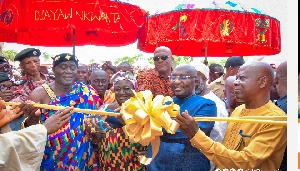 Vice President Dr Bawumia (Second person from right)
Vice President Dr Bawumia (Second person from right)
Vice President Dr Mahamudu Bawumia has commissioned another new Fire Service Academy and Training School in Duayaw-Nkwanta in the Tano North District of the Ahafo Region.
The unveiling of the facility brings the total number of the Service’s Training Schools to three, constructed by the Akufo-Addo-led Government.
Prior to this, Ghana had only one Fire Service Training School located in Jamestown in the Greater Accra Region.
Two months ago, Vice President Bawumia commissioned the country’s second Training School in Wungu in the North East Region.
Speaking at the commissioning at Duayaw-Nkwanta, Dr Bawumia said it marked the “unwavering commitment” of the Government towards strengthening the fire service and protecting lives and property.
“It is with immense pride and gratitude that I stand before you today, on this historic occasion—the commissioning of the first phase of the Duayaw Nkwanta Fire Academy and Training School,” Dr Bawumia said.
“This milestone reflects the unwavering commitment of the Government of Ghana to the safety and well-being of its citizens.”
This training school stands as a testament to the Government’s pledge in 2017 to increase the number of training schools for the Ghana National Fire Service (GNFS) from one to four since independence.
“We are happy to be here in less than seven weeks following the successful commissioning of the Wungu Fire Academy and Training School in the North East Region on Friday, January 19, 2024, to commission the second and third Fire Academy and Training School in the country, specifically here at Duayaw Nkwanta in the Ahafo Region.”
“Today’s event, which marks another significant step towards achieving the Government’s commitment to protecting its citizenry is unwavering.”
The new Training School has modern training facilities and equipment, including two hydraulic platforms to reach the 16th floor, to fight fires and effect rescue for key institutions such as the Ghana National Fire Service (GNFS).
The Vice President described the new facility as a strategic move to ensure the safety of lives, businesses, livelihoods, and property.
The Vice President highlighted the significant support the Government offered to the Ghana National Fire Service, including the provision of modern equipment and expansion of the human resource capacity of the Service in the past seven years to respond efficiently to emergencies.
Among the equipment are command vehicles, modern fire engines, drones, rapid intervention vehicles, buses, appropriate personal protective equipment (APPEs), rescue and firefighting equipment.
This investment in modern equipment aligns with the Government’s vision to empower the GNFS to deliver on its lawful mandate of saving lives and property.
These resources would not only enhance the Service’s capacity to handle diverse and complex firefighting scenarios but also contribute to the overall safety and security of communities, Dr Bawumia stated.
The Ghana Fire Service, in 2022, recorded 6,154 fires compared with 5, 973 fires in 2023, which translates to a 2.94 per cent rate in reduction.
That feat, he said, was a clear testament to the effectiveness of the government’s initiatives to support training and dedicated efforts of the firefighting force.
On staff strength of the Service, Dr Bawumia noted that the Government had almost doubled its personnel from the number met in 2017.
“It is unprecedented in the history of the GNFS for a single government to recruit over 7000 personnel, thus increasing the workforce to over 15,000 in just seven years.”
Despite the successes, Dr Bawumia said a lot more needed to be done to protect lives and property and, thus, assured of the Government’s commitment to supporting the Service to realise its vision and mandate.
Nana Boakye Bonsu, the Acting President of the Duayaw Nkwanta Traditional Council, expressed gratitude to the Government for the Training School.